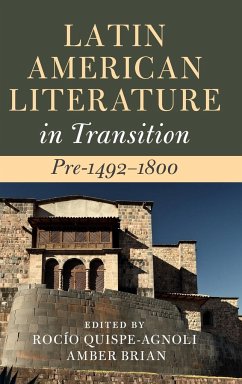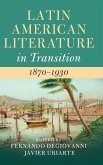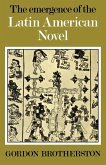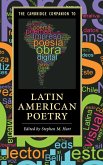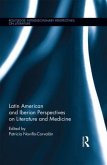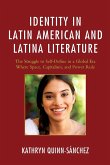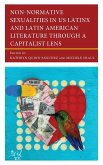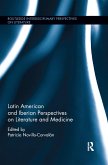Latin American Literature in Transition Pre-1492-1800
Herausgeber: Quispe-Agnoli, Rocío
Latin American Literature in Transition Pre-1492-1800
Herausgeber: Quispe-Agnoli, Rocío
- Gebundenes Buch
- Merkliste
- Auf die Merkliste
- Bewerten Bewerten
- Teilen
- Produkt teilen
- Produkterinnerung
- Produkterinnerung
This volume examines the transitions from approximately 1492-1800 that intersected and shaped the emergence of Latin America and its distinctive literary production. It is built around six thematic areas that underline the key processes that shaped this period and its legacy: space; body; belief systems; literacies; languages; and identities.
Andere Kunden interessierten sich auch für
![Latin American Literature in Transition 1870-1930 Latin American Literature in Transition 1870-1930]() Latin American Literature in Transition 1870-1930107,99 €
Latin American Literature in Transition 1870-1930107,99 €![The Emergence of the Latin American Novel The Emergence of the Latin American Novel]() Gordon BrotherstonThe Emergence of the Latin American Novel36,99 €
Gordon BrotherstonThe Emergence of the Latin American Novel36,99 €![The Cambridge Companion to Latin American Poetry The Cambridge Companion to Latin American Poetry]() The Cambridge Companion to Latin American Poetry87,99 €
The Cambridge Companion to Latin American Poetry87,99 €![Latin American and Iberian Perspectives on Literature and Medicine Latin American and Iberian Perspectives on Literature and Medicine]() Latin American and Iberian Perspectives on Literature and Medicine207,99 €
Latin American and Iberian Perspectives on Literature and Medicine207,99 €![Identity in Latin American and Latina Literature Identity in Latin American and Latina Literature]() Kathryn Quinn-SánchezIdentity in Latin American and Latina Literature59,99 €
Kathryn Quinn-SánchezIdentity in Latin American and Latina Literature59,99 €![Non-Normative Sexualities in US Latinx and Latin American Literature Through a Capitalist Lens Non-Normative Sexualities in US Latinx and Latin American Literature Through a Capitalist Lens]() Non-Normative Sexualities in US Latinx and Latin American Literature Through a Capitalist Lens109,99 €
Non-Normative Sexualities in US Latinx and Latin American Literature Through a Capitalist Lens109,99 €![Latin American and Iberian Perspectives on Literature and Medicine Latin American and Iberian Perspectives on Literature and Medicine]() Latin American and Iberian Perspectives on Literature and Medicine68,99 €
Latin American and Iberian Perspectives on Literature and Medicine68,99 €-
-
-
This volume examines the transitions from approximately 1492-1800 that intersected and shaped the emergence of Latin America and its distinctive literary production. It is built around six thematic areas that underline the key processes that shaped this period and its legacy: space; body; belief systems; literacies; languages; and identities.
Hinweis: Dieser Artikel kann nur an eine deutsche Lieferadresse ausgeliefert werden.
Hinweis: Dieser Artikel kann nur an eine deutsche Lieferadresse ausgeliefert werden.
Produktdetails
- Produktdetails
- Verlag: Cambridge University Press
- Seitenzahl: 400
- Erscheinungstermin: 8. Dezember 2022
- Englisch
- Abmessung: 235mm x 157mm x 28mm
- Gewicht: 798g
- ISBN-13: 9781108838832
- ISBN-10: 1108838839
- Artikelnr.: 63699323
- Herstellerkennzeichnung
- Libri GmbH
- Europaallee 1
- 36244 Bad Hersfeld
- gpsr@libri.de
- Verlag: Cambridge University Press
- Seitenzahl: 400
- Erscheinungstermin: 8. Dezember 2022
- Englisch
- Abmessung: 235mm x 157mm x 28mm
- Gewicht: 798g
- ISBN-13: 9781108838832
- ISBN-10: 1108838839
- Artikelnr.: 63699323
- Herstellerkennzeichnung
- Libri GmbH
- Europaallee 1
- 36244 Bad Hersfeld
- gpsr@libri.de
Part I. Land, Space, Territory: 1. Migrations and foundations in the
literature of New Spain Pablo García Loaeza; 2. Defining Portuguese
America: The first depictions of Brazil within the context of overseas
expansion Sarissa Carneiro; 3. The conquest of space in the Relación del
Descubrimiento del Rio Marañon by Geronimo de Ypori (c. 1630) Yamile Silva;
4. Disturbing place: Afro-Iberian herbalists interrupt imperial Cartagena
de Indias Kathryn Joy McKnight; Part II. Body: 5. The Health of the Soul:
Religious guidance and medical practice in early colonial Mexico Yarí Pérez
Marín; 6. Viceroy Valero's heart: A traveling relic, and an embodied
metaphor in transit to the Indies Judith Farré Vidal; 7. Humoralism and
colonial subjugation: Indians and medical knowledge in the sixteenth and
seventeenth centuries Germán Morong Reyes; 8. Assaulted bodies: the case of
two enslaved black women in the port city of Santa María de los Ángeles de
Buenos Aires, 1772-1778 Mariselle Meléndez; Part III. Belief Systems: 9.
The flood story in the Huarochirí Manuscript and other early colonial
andean texts Soledad González Díaz; 10. Idol or Martyr: Sacredness and
symbol in the religiosity of the Indies Esperanza López Parada; 11. Creole
religiosity in colonial Mexico: Devotional cultures in transition Stephanie
Kirk; 12. The empire beyond Spanish America: Spanish Augustinians in the
Pacific World Eva María Mehl; 13. Indigenous peoples and Catholicism in
eighteenth-century Mexico City Mónica Díaz; Part IV. Literacies: 14.
Transcultural intertextuality in colonial Latin America Galen Brokaw; 15.
Becoming a book: The reproduction, falsification, and digitalization of
colonial codices José Ramón Jouve-Martín; 16. From print to public
performance to Relaciones de fiestas: Don Quixote in viceregal festivals
Eva María Valero Juan; 17. Colonial Latin American bibliography and the
indigenous text Clayton McCarl and Lindsay Van Tine; Part V. Languages: 18.
Technologies of communication in transition: Indigenous orality and writing
in colonial Mexico Kelly S. McDonough; 19. A baroque arte: Horacio Carochi
and the tradition of nahuatl grammars Caroline Egan; 20. Acquiring a voice:
the plebeians speak in early colonial Río de La Plata Loreley El Jaber; 21.
Knowledge in transition: Rethinking the science of sameness in Sor Juana
Inés de la Cruz's New Spain Allison Margaret Bigelow; Part VI. Identities:
22. Textual figures and modalities of change: The Soldier, the Translator,
the Plebeian, and the Woman Chronicler Valeria Añón; 23. Diego Muñoz
Camargo and the destabilization of the Relación Geográfica: adaptation and
variation in the Mestizo Chronicle Héctor Costilla Martínez; 24.
Representing/erasing the other in colonial Brazil's eighteenth-century epic
poetry Sandra Sousa.
literature of New Spain Pablo García Loaeza; 2. Defining Portuguese
America: The first depictions of Brazil within the context of overseas
expansion Sarissa Carneiro; 3. The conquest of space in the Relación del
Descubrimiento del Rio Marañon by Geronimo de Ypori (c. 1630) Yamile Silva;
4. Disturbing place: Afro-Iberian herbalists interrupt imperial Cartagena
de Indias Kathryn Joy McKnight; Part II. Body: 5. The Health of the Soul:
Religious guidance and medical practice in early colonial Mexico Yarí Pérez
Marín; 6. Viceroy Valero's heart: A traveling relic, and an embodied
metaphor in transit to the Indies Judith Farré Vidal; 7. Humoralism and
colonial subjugation: Indians and medical knowledge in the sixteenth and
seventeenth centuries Germán Morong Reyes; 8. Assaulted bodies: the case of
two enslaved black women in the port city of Santa María de los Ángeles de
Buenos Aires, 1772-1778 Mariselle Meléndez; Part III. Belief Systems: 9.
The flood story in the Huarochirí Manuscript and other early colonial
andean texts Soledad González Díaz; 10. Idol or Martyr: Sacredness and
symbol in the religiosity of the Indies Esperanza López Parada; 11. Creole
religiosity in colonial Mexico: Devotional cultures in transition Stephanie
Kirk; 12. The empire beyond Spanish America: Spanish Augustinians in the
Pacific World Eva María Mehl; 13. Indigenous peoples and Catholicism in
eighteenth-century Mexico City Mónica Díaz; Part IV. Literacies: 14.
Transcultural intertextuality in colonial Latin America Galen Brokaw; 15.
Becoming a book: The reproduction, falsification, and digitalization of
colonial codices José Ramón Jouve-Martín; 16. From print to public
performance to Relaciones de fiestas: Don Quixote in viceregal festivals
Eva María Valero Juan; 17. Colonial Latin American bibliography and the
indigenous text Clayton McCarl and Lindsay Van Tine; Part V. Languages: 18.
Technologies of communication in transition: Indigenous orality and writing
in colonial Mexico Kelly S. McDonough; 19. A baroque arte: Horacio Carochi
and the tradition of nahuatl grammars Caroline Egan; 20. Acquiring a voice:
the plebeians speak in early colonial Río de La Plata Loreley El Jaber; 21.
Knowledge in transition: Rethinking the science of sameness in Sor Juana
Inés de la Cruz's New Spain Allison Margaret Bigelow; Part VI. Identities:
22. Textual figures and modalities of change: The Soldier, the Translator,
the Plebeian, and the Woman Chronicler Valeria Añón; 23. Diego Muñoz
Camargo and the destabilization of the Relación Geográfica: adaptation and
variation in the Mestizo Chronicle Héctor Costilla Martínez; 24.
Representing/erasing the other in colonial Brazil's eighteenth-century epic
poetry Sandra Sousa.
Part I. Land, Space, Territory: 1. Migrations and foundations in the
literature of New Spain Pablo García Loaeza; 2. Defining Portuguese
America: The first depictions of Brazil within the context of overseas
expansion Sarissa Carneiro; 3. The conquest of space in the Relación del
Descubrimiento del Rio Marañon by Geronimo de Ypori (c. 1630) Yamile Silva;
4. Disturbing place: Afro-Iberian herbalists interrupt imperial Cartagena
de Indias Kathryn Joy McKnight; Part II. Body: 5. The Health of the Soul:
Religious guidance and medical practice in early colonial Mexico Yarí Pérez
Marín; 6. Viceroy Valero's heart: A traveling relic, and an embodied
metaphor in transit to the Indies Judith Farré Vidal; 7. Humoralism and
colonial subjugation: Indians and medical knowledge in the sixteenth and
seventeenth centuries Germán Morong Reyes; 8. Assaulted bodies: the case of
two enslaved black women in the port city of Santa María de los Ángeles de
Buenos Aires, 1772-1778 Mariselle Meléndez; Part III. Belief Systems: 9.
The flood story in the Huarochirí Manuscript and other early colonial
andean texts Soledad González Díaz; 10. Idol or Martyr: Sacredness and
symbol in the religiosity of the Indies Esperanza López Parada; 11. Creole
religiosity in colonial Mexico: Devotional cultures in transition Stephanie
Kirk; 12. The empire beyond Spanish America: Spanish Augustinians in the
Pacific World Eva María Mehl; 13. Indigenous peoples and Catholicism in
eighteenth-century Mexico City Mónica Díaz; Part IV. Literacies: 14.
Transcultural intertextuality in colonial Latin America Galen Brokaw; 15.
Becoming a book: The reproduction, falsification, and digitalization of
colonial codices José Ramón Jouve-Martín; 16. From print to public
performance to Relaciones de fiestas: Don Quixote in viceregal festivals
Eva María Valero Juan; 17. Colonial Latin American bibliography and the
indigenous text Clayton McCarl and Lindsay Van Tine; Part V. Languages: 18.
Technologies of communication in transition: Indigenous orality and writing
in colonial Mexico Kelly S. McDonough; 19. A baroque arte: Horacio Carochi
and the tradition of nahuatl grammars Caroline Egan; 20. Acquiring a voice:
the plebeians speak in early colonial Río de La Plata Loreley El Jaber; 21.
Knowledge in transition: Rethinking the science of sameness in Sor Juana
Inés de la Cruz's New Spain Allison Margaret Bigelow; Part VI. Identities:
22. Textual figures and modalities of change: The Soldier, the Translator,
the Plebeian, and the Woman Chronicler Valeria Añón; 23. Diego Muñoz
Camargo and the destabilization of the Relación Geográfica: adaptation and
variation in the Mestizo Chronicle Héctor Costilla Martínez; 24.
Representing/erasing the other in colonial Brazil's eighteenth-century epic
poetry Sandra Sousa.
literature of New Spain Pablo García Loaeza; 2. Defining Portuguese
America: The first depictions of Brazil within the context of overseas
expansion Sarissa Carneiro; 3. The conquest of space in the Relación del
Descubrimiento del Rio Marañon by Geronimo de Ypori (c. 1630) Yamile Silva;
4. Disturbing place: Afro-Iberian herbalists interrupt imperial Cartagena
de Indias Kathryn Joy McKnight; Part II. Body: 5. The Health of the Soul:
Religious guidance and medical practice in early colonial Mexico Yarí Pérez
Marín; 6. Viceroy Valero's heart: A traveling relic, and an embodied
metaphor in transit to the Indies Judith Farré Vidal; 7. Humoralism and
colonial subjugation: Indians and medical knowledge in the sixteenth and
seventeenth centuries Germán Morong Reyes; 8. Assaulted bodies: the case of
two enslaved black women in the port city of Santa María de los Ángeles de
Buenos Aires, 1772-1778 Mariselle Meléndez; Part III. Belief Systems: 9.
The flood story in the Huarochirí Manuscript and other early colonial
andean texts Soledad González Díaz; 10. Idol or Martyr: Sacredness and
symbol in the religiosity of the Indies Esperanza López Parada; 11. Creole
religiosity in colonial Mexico: Devotional cultures in transition Stephanie
Kirk; 12. The empire beyond Spanish America: Spanish Augustinians in the
Pacific World Eva María Mehl; 13. Indigenous peoples and Catholicism in
eighteenth-century Mexico City Mónica Díaz; Part IV. Literacies: 14.
Transcultural intertextuality in colonial Latin America Galen Brokaw; 15.
Becoming a book: The reproduction, falsification, and digitalization of
colonial codices José Ramón Jouve-Martín; 16. From print to public
performance to Relaciones de fiestas: Don Quixote in viceregal festivals
Eva María Valero Juan; 17. Colonial Latin American bibliography and the
indigenous text Clayton McCarl and Lindsay Van Tine; Part V. Languages: 18.
Technologies of communication in transition: Indigenous orality and writing
in colonial Mexico Kelly S. McDonough; 19. A baroque arte: Horacio Carochi
and the tradition of nahuatl grammars Caroline Egan; 20. Acquiring a voice:
the plebeians speak in early colonial Río de La Plata Loreley El Jaber; 21.
Knowledge in transition: Rethinking the science of sameness in Sor Juana
Inés de la Cruz's New Spain Allison Margaret Bigelow; Part VI. Identities:
22. Textual figures and modalities of change: The Soldier, the Translator,
the Plebeian, and the Woman Chronicler Valeria Añón; 23. Diego Muñoz
Camargo and the destabilization of the Relación Geográfica: adaptation and
variation in the Mestizo Chronicle Héctor Costilla Martínez; 24.
Representing/erasing the other in colonial Brazil's eighteenth-century epic
poetry Sandra Sousa.

